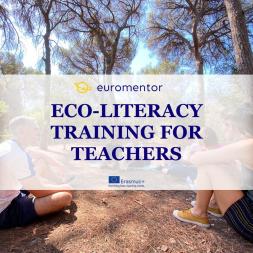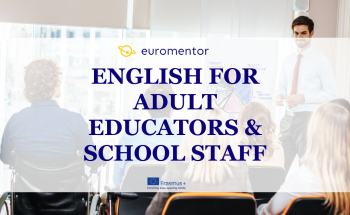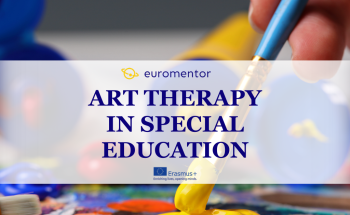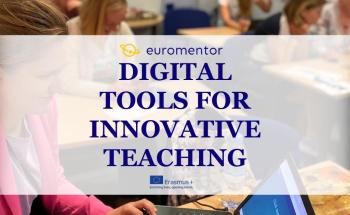
Third-party on-site course
Eco-literacy Training for Teachers (Barcelona, Spain)
Eco-literacy, also known as ecological literacy, refers to the understanding of ecological principles, systems, and relationships that govern the natural world. This Erasmus+ course is a specialised and comprehensive educational program aimed at equipping educators with the necessary knowledge and skills to integrate ecological principles and environmental awareness into their teaching practices.
27.02.2024
No upcoming session
Spain
,
Cataluña
,
Barcelona
Description
- Throughout the course, teachers receive in-depth instruction on fundamental ecological concepts, such as ecosystems, biodiversity, ecological cycles, and the interdependence of living organisms. They explore pressing environmental issues, including climate change, pollution, habitat destruction, and resource depletion, gaining valuable insights into the impact of human activities on the environment. Participants also learn about sustainability practices and how to promote environmentally responsible behaviour within their classrooms and communities.
- The course emphasises practical strategies to integrate eco-literacy across various subjects and grade levels. Educators learn how to incorporate environmental themes into science, social studies, language arts, math, and other disciplines, enhancing students' learning experiences. Experiential learning is a key aspect of the course, with teachers engaging in hands-on outdoor activities, field trips, and environmental projects to connect theory with real-life experiences. The course places a strong emphasis on empowering students to take action and become environmentally responsible citizens. Teachers learn how to facilitate environmental projects and initiatives in schools, motivating students to make positive changes in their lives and communities.
Learning objectives
- Knowledge of Ecological Principles: Participants gain a deep understanding of fundamental ecological concepts, including ecosystems, biodiversity, food webs, energy flows, and ecological cycles.
- Awareness of Environmental Issues: Teachers become knowledgeable about pressing environmental challenges, such as climate change, pollution, habitat destruction, and resource depletion.
- Integration of Eco-Literacy in Teaching: Educators learn practical strategies to incorporate eco-literacy across different subjects and grade levels.
- Experiential Learning and Outdoor Education: Participants engage in hands-on, outdoor, and experiential learning activities.
- Resources and Materials: Teachers gain access to a range of educational resources, including books, lesson plans, multimedia materials, and online tools, which enable them to enhance their teaching with engaging and informative content on eco-literacy.
- Systems Thinking and Problem-Solving: The training fosters systems thinking, enabling educators to understand the interconnectedness of ecological and social systems.
- Community Engagement and Partnerships: Participants learn how to collaborate with local environmental organisations, community groups, and experts to strengthen their eco-literacy initiatives.
- Promoting Environmental Action: The course empowers teachers to encourage students to take action and become environmentally responsible citizens.
- Course Category: Sustainability & Outdoor Learning
Methodology & assessment
Methodology:
Interactive Workshops: The course employs a hands-on approach, featuring interactive workshops, group discussions, and collaborative activities.
Peer Learning: Participants engage in peer-to-peer learning, benefiting from the diverse backgrounds and experiences of their fellow educators.
Practical Application: The training emphasises the practical application of concepts learned.
Assessment:
Formative Assessment: Continuous assessment methods are employed throughout the course, including quizzes, group presentations, and reflective journals.
Final Project: Participants are required to develop a final project that incorporates the knowledge and skills gained during the course.
Course Evaluation: At the end of the course, participants are asked to complete an evaluation form, offering insights into the effectiveness of the training program.
Interactive Workshops: The course employs a hands-on approach, featuring interactive workshops, group discussions, and collaborative activities.
Peer Learning: Participants engage in peer-to-peer learning, benefiting from the diverse backgrounds and experiences of their fellow educators.
Practical Application: The training emphasises the practical application of concepts learned.
Assessment:
Formative Assessment: Continuous assessment methods are employed throughout the course, including quizzes, group presentations, and reflective journals.
Final Project: Participants are required to develop a final project that incorporates the knowledge and skills gained during the course.
Course Evaluation: At the end of the course, participants are asked to complete an evaluation form, offering insights into the effectiveness of the training program.
Certification details
Our courses are in line with the Erasmus+ Quality standards for courses under Key Action 1 (learning mobility of individuals)
Participants are required to attend a minimum of 80% of the course sessions. Additionally, active engagement and participation in group discussions and practical activities are encouraged to enhance the learning experience.
Upon the successful completion of the training course, participants will obtain;
- Certificate of Attendance: includes the name of the participant and the trainer, the location, the dates, learning hours and competences acquired.
- Learning Agreement(s)
- Europass Mobility Document(s)
Pricing, packages and other information
-
Price:400Euro
-
Package contents:Course
Additional information
-
Language:English
-
Target audience ISCED:Early childhood education (ISCED 0)Primary education (ISCED 1)Lower secondary education (ISCED 2)
-
Target audience type:TeacherStudent TeacherHead Teacher / Principal
-
Learning time:25 hours or more
More courses by this organiser

On-site
English Language Essentials for School Management (Barcelona, Spain)
Next upcoming session
-
Barcelona
,
Spain
Organisation picture
Organised by
Euromentor

On-site
Art Therapy in Special Education (Barcelona, Spain)
Next upcoming session
-
Barcelona
,
Spain
Organisation picture
Organised by
Euromentor

On-site
Digital Tools for Innovative Teaching (Barcelona, Spain)
Next upcoming session
-
Barcelona
,
Spain
Organisation picture
Organised by
Euromentor

